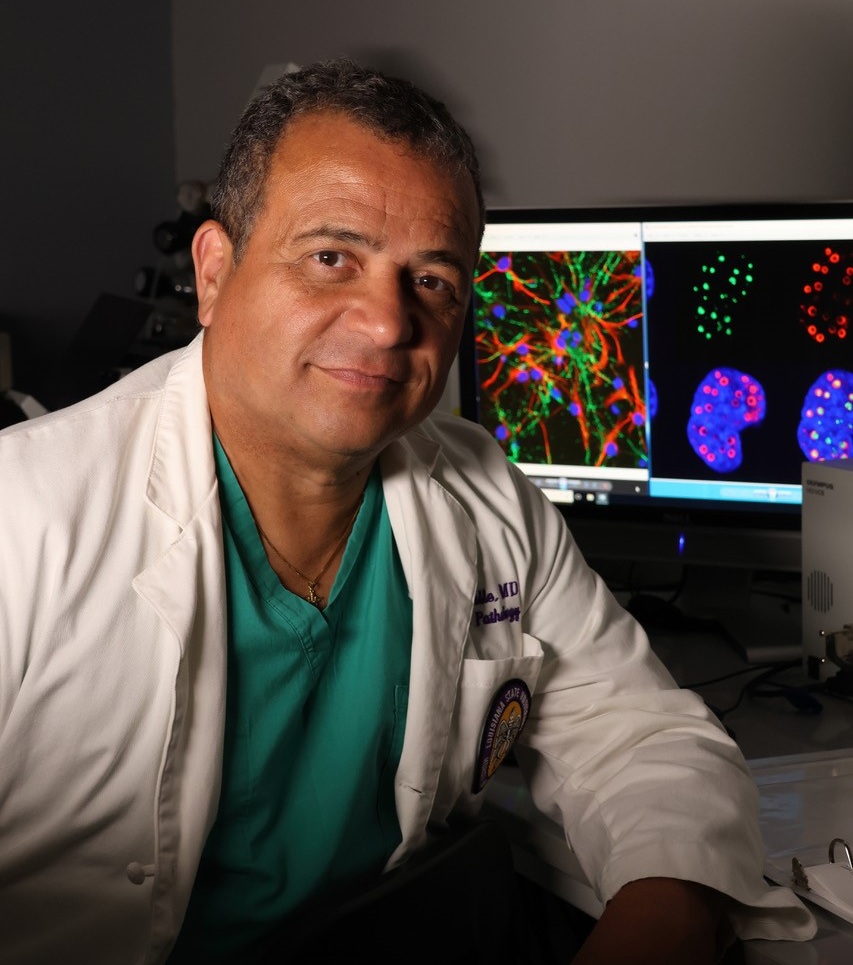Luis Del Valle, MD
ldelva@lsuhsc.edu
Associate Professor
Director, Molecular Histopathology & Analytical Microscopy Core
Research Interests:
1. Physiopathology of Progressive Multifocal Leukoencephalopathy (PML)
For the last 20 years our lab has been focused on studying the physio-pathological mechanisms involved in Progressive Multifocal Leukoencephalopathy. PML is a fatal demyelinating disease, resulting from the opportunistic infection with the human neurotropic Polyomavirus JC (JCPyV), frequently seen in individuals with AIDS and many other immunosuppressive conditions, most notably in recent years, immunomodulator therapies for autoimmune diseases. Our first project was aimed at answering why PML is significantly more frequent in patients with AIDS than any other immunosuppressive condition. We found a direct crosstalk between the HIV-1 transactivator protein Tat and the JCPyV promoter. In addition, we have discovered several other pathways involved in the activation of the JCPyV promoter, including TGF- and HIF-1, which are potential targets for novel therapies against this devastating disease. However, our most important discovery was the reactivation of the normally dormant anti-apoptotic protein, Survivin by JCPyV. Survivin is normally expressed during embryonic development and is completely absent in fully differentiated tissues. We discovered that JCPyV T-Antigen is capable of reactivate Survivin expression in order to prevent apoptosis and allow the virus time to complete its replication, lytic cycle. Currently we are studying the profile of microRNAs up and downregulated in PML.
2.JCPyV Mechanisms of Oncogenesis in Brain and GI tract tumors.
Our second main project is aimed at understanding the molecular and cellular mechanisms used by JC Virus in brain and GI tract oncogenesis. Our early publications documented for the first time an association between the human neurotropic virus JCPyV, and different varieties of embryonal and glial brain tumors, including medulloblastomas, astrocytomas, oligodendrogliomas and glioblastomas. While the oncogenicity of JCPyV was known in rodents and primates, our studies demonstrated its role in the pathogenesis of human tumors. In addition, we discovered several mechanisms of oncogenesis, which include binding and inactivation of p53 and Rb, as well as the nuclear translocation of IRS-1, which results in impairment of faithful DNA repair mechanisms and the accumulation of mutations. Later, we also described the presence of JC viral genomic sequences in tumors of the gastrointestinal tract, specifically esophageal carcinomas and colon adenocarcinomas. In these, we described the dysregulation of the Wnt signaling pathway by JCPyV, specifically by the viral oncogenic protein T-Antigen which is capable of binding -catenin and translocating it to the nucleus where it activates the c-Myc pathway.

